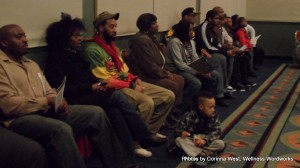On Thursday I had an interaction with a psychologist where I basically said, “I am not sure I want to attend a workshop you are leading if you don’t know about the mental health civil rights movement and the problems with medications and labels.”
This person’s response was, “Well, I agree with you about medications and labels and I help people get UnDiagnosed pretty regularly.” This was a 20 minute conversation and this speech of his took 19 minutes. BUT he did not ask me what or who these mental health civil rights workers were or how he could help. It didn’t seem like he thought I had anything to contribute to his education. Somehow this deeply offended me. I thought, “How can you say you’re not the butcher if you don’t know the true extent of the slaughter?”

My second thought was, “Well, if you know the problems, why are you not working on a systematic way to fix them? Or talking to people like me who are?” What good is throwing back one starfish at a time when we can fix the tides so the starfish don’t keep getting washed up on the beach?
But then, of course, is the saying, “Well, it mattered to that starfish.” It might be that looking at starfish one at a time helps keep from becoming overwhelmed.
I miss my friend Al who died of being medicated and labeled. I miss my Olympic team training partner Brenda who died from knowing the injustice of this system and choosing not to enter it and not knowing where else to turn. I figure all mental health professionals are in a position to know about the extent of the problems, and should want to know. But what I have found is that they are actually my most difficult audience to talk to.
The general public is often quite appreciative of my work. They truly get problems with medications and labels and understand ideas like The Underground Railroad and building social messaging efforts. They like the new language around emotional distress so we no longer have to use the words of disease and oppression. They often laugh or identify strongly with catchy phrases I come up with:
Tweetable mental health advocacy messages

- My job is not to get people into the mental health system, it’s to get them out.
- Recovery means “all this” goes away.
- A diagnosis can be a permanent solution to a temporary problem.
- Community mental health is cheaper than jail, but just community is even cheaper.
- Community mental health centers are dinosaurs, budget cuts are the asteroids, and peer support is the mammals.
- If meds alone caused recovery, everyone in the US would be recovered by now.
- Schizophrenia is when someone freaks out and sees a doctor instead of talking to the priest, psychic, local skateboarder dude, or the Star Trek club.
- Problems in mental health care can be summed up in one word: “Medicalization.” The solution takes two words, “Peer support.”
- Fund what’s effective, not what’s expensive.
- Look at temporary emotional distress, not permanent disease.
Whenever mental health professionals hear these, they either just blow me off, or tell me these phrases are offensive. I designed some Please Cut Our Budgets shirts that really raised some hackles. The other response I get from mental health professionals is that they say, “Oh, but I agree with you.” Once I brought up the problems with medications and labels at a meeting, and every single person in the room had to go around the table and give me their justification, their “I am not the Butcher” speech. I’m sure many advocates have heard these speeches. In this particular room, they went like this:
Examples of The “I Am Not the Butcher” Speech
- “Oh, well, I’ve been to a lot of group homes and I see people overmedicated and it’s usually when staff is trying to make their life easier. BUT….I’m not sure it’s right to question medication effectiveness.”
- “My organization is a big organization, and we need to challenge our assumptions, and stay open to new ideas…. BUT What would you do with those people if we didn’t have hospitals?”
- “I work in government and we fund many different organizations and we make sure to provide accountability. We fund police trainings, we try to do a good job….BUT making approaches are consumer driven is good enough.”
- “I just try to ask people what will help them and not get into my personal point of view….BUT what you’re talking about is just a belief and semantcs.”

This last one was from a fellow service recipient, but one who is a disease model advocate from one of the disease model advocacy organizations. Later someone told me something funny, that “semantics” means meaning. Anything with semantics has meaning. So when people who talk about your point of view being “semantics” it’s saying, “You are saying something I don’t want to hear.”
There are many mental health professionals who know some of the problems with mental heath care but not the full extent of the damage being done. They choose not to work in advocacy or reforming the system. Yet there are many areas of injustice I am aware of where I choose not to work: climate change, gender rights, prison reform, drug laws, water rights, etc.
What makes me different for not working on those areas than mental health providers who are not advocates? Is it that many of them, in their ignorance, are still harming my brothers and sisters? But my lack of efforts on climate change may be harming my African brothers and sisters dying of drought. My lack of efforts on prison reform will lead to detained people’s deaths. My lack of efforts on water rights might lead to a massive die-off when the 40% of people in the world who get drinking water from glacial runoff have no more glaciers. So how am I not a butcher?
We are all the Butcher

I guess what I’m saying is that everyone has to, in their own head, tell themselves a story about why they are the good guy, why they are doing the right thing, why they are making the best of their life, why they are doing the best they can. So, when we come back to my question about, “How can you say you’re not a butcher if you don’t know the extent of the slaughter?”
I think I’ve come up with two answers:
1) We are all the butcher. We do need to work on finding effective consequences for the 1% of people doing the worst offenses. We need to figure out civil and/or criminal liability so the pharma CEO’s and the worst of the academicians do not repeat what they have done.

Yet, before we get mad at people for not working in mental health advocacy, why are we not working in gardening, pollution, water rights, LGBTQIA rights, or bicycle advocacy? The answer for me personally is that I have chosen to focus my efforts in one area because if we can answer our problems, maybe it will show us how to answer other problems. But people may have different answers and different other priorities.
Most of us are just caught along. In a way, we are all killing each other and just doing the best we can to minimize it. When we harass someone for having a slightly different role in the killing as us, it just makes us mean, and not followers of the practices of forgiveness that are a part of many spiritual practices. I have a poem about this, called, “I am the Oppressed and the Oppressor.”
2) Telling someone they are the butcher isn’t effective to stimulate learning, only defensiveness. I’ll finish with a quote from Pablo Sadler, the Medical Director of the New York City Bureau of Mental Health that I met at the Foundation for Excellence in Mental Health Care conference in North Carolina. “You cannot call me a butcher then ask to sit down with me.”
And right now we have a lot of sitting down and talking to do.












Great post, and I agree that we’re all the butcher to the extent that we’re all more or less alienated from life, nature, God, ourselves, however you want to put it. I remember that I often was confused, and, yeah, overwhelmed thinking of all the injustice in the world, and where to put my, limited, energy to stop it. Should I help save the whales, or the rain forest? Should I say no to atomic power, or Apartheid? Should I join this organization, or that one, or or or??? — And I have to admit that, at that point of time, and although having watched the Cockoo’s Nest and read a few books mentioning psychiatry in a critical way, and having my suspicions towards the mh field, I lacked both sufficient knowledge about what really was (and still is) going on in it to have other than my suspicions, and enough personal motivation to look for that knowledge and do activism. So I ended up putting my energy where most of my friends put theirs.
But then, rather unexpectedly, and many years later, I found myself having a quite strong personal motivation to make up for lost ground. All of a sudden pollution, war, deforestation, racism, etc. etc., didn’t seem quite as urgent to protest against anymore as the mh system’s human rights violations. However, after initially seeing these human rights violations through a rather narrow lense, it became more and more clear to me how they actually are just another “symptom” of the same “disease” that also causes all other kinds of violence and injustice in this world. So whenever possible, I try to “broaden” my criticism, from talking about certain concrete circumstances inside the mh system to the mindset, the culture and ideology I see has brought both these and virtually all other reprehensible, to put it mildly, circumstances in this world about. It can be overwhelming… Because it’s everywhere, and very few people, even among activists, are aware of it. I admire somebody like Derrick Jensen, who, first and foremost is a political and environmental activist, but unlike most political and environmental activists (Amnesty for instance) doesn’t hesitate to include the mh field in his criticism and to take a stand when you ask him about it.
Report comment
Discovering that the world is a mad sort of place, that there is no justice,that others impose on you their world-view and their standards by force, that the rich and poweful are allowed to get away with destroying nature etc. is exactly what drives the younger generation, when they start thinking for themselves, into drugs or in my case into madness. I started kicking back at the establishment, rules and regulations at school which got me into trouble with my parents. My parents were too exhausted by the daily grind and thought that I should comply like everyone else. Not being compliant by nature led me to turn my back on everyone and to retire in my own little world etc etc I am sure you know what I am on about.There is this deep mystery say the “specialists” why so many people develop “schizophrenia” at the age of 17-25. It is actually pure logic as far as my thinking goes.
Report comment
Another thought, concerning professionals who see what is going on in their profession, but nevertheless choose to not do anything about it. You could argue that any professional who knows about malpractice going on in their field has an obligation to do something about it. People would righteously expect you to do something about it. But of course the circumstances are a little more complicated when it comes to the mh field than they are regarding most other professions, since malpractice in this field isn’t commonly recognized as such, but seen as best practice, and you risk unpleasant consequences for yourself if you criticise this alleged “best practice”. My own therapist said that if she told her colleagues (about a “psychotic” client making a full recovery completely without drugs, and additionally in a relatively short space of time), they wouldn’t believe her. Read between the lines: she didn’t intend to tell any of them, afraid of making a fool of herself. Most likely the majority of her colleagues would indeed have sneered at her, not believing a word. But maybe just one of them would have become curious. She missed an important opportunity to bring about some change, and also, to me it seems a lot more unpleasant having to be dishonest, and compromise oneself, than running the risk of others not believing you. But that is me, not her, so…
Report comment
There are too many among the “specialists” who have seen light, afraid to stand up and speak out. There are also too many injured patients afraid to stand up and have their voice heard. After going through the mental health system, they have been so traumatised that all they want is to heal and to get away from anything that reminds them of their trauma. There is also the fear of the power of organised psychiatry and that once diagnosed, they could be yanked back into hospital at any moment at the whim of any doctor.
Report comment
You bring out some good points. I know two psychiatrists who are sincerely good people, yet they keep drugging the people in their care like you wouldn’t believe. I’ve always been in a quandry about this because personally I really like this woman and this man, but I know that they are contributing significantly to the harm that is being done to people; all in the name of “good practice.” I keep thinking of the old saying that my grandmother and mother always reminded me of: “The road to hell is paved with good intentions!” I cannot believe that any psychiatrist practicing today can say that they really don’t know about the harm that their drugs do to people. I want them to look me squarely in the eye and state this. I don’t think they can. They’ve got to know the harm that they’re doing but they won’t stop because it would mean less money for them and less prestige because then they couldn’t state emphatically that they’re real doctors. Too much money and ego tied up in giving up the drugs and their “good practice.” I am a peer worker in a state hospital. When I went to work here I was told by the Director of Clinical Services that I would NOT BE AN ADVOCATE NOR WOULD I DISCUSS MEDICATIONS WITH ANY OF THE PATIENTS THAT I HAD CONTACT WITH!” They pull your teeth before you even try to bite them, without asking you about how you feel about anything. They are totally defensive, which tells me that they know that their “Good practice” is no such thing!
Report comment
The psychiatric drugs are to prevent injury and crime. The Psychiatrist thinks their patients anger and stupidity are “psychosis” . The solution to the problem of psychosis is to stop the patient from feeling angry, and making the patient MORE stupid, too stupid to decide to do anything. People with money want the psychotic (angry and stupid) controlled , so the system works. “Good ends justify evil means.”
Report comment
“You cannot call me a butcher then ask to sit down with me.”
You cannot forcibly drug us and expect us to be the slightest bit interested in sitting down with you, for we sit down on the seats to sit with you with the very butts that you forcibly injected.
Report comment
I had the same reaction. Why should we want to sit down with you? I felt that this article, while bringing up good points along the way, went in the wrong direction. It is important that someone be held responsible (be labeled as the butcher, if you like) when so many people are being dangerously drugged. This absolutely should be those who are doling out the drugs, the psychiatrists. They are not ignorant of the terrible harm they are causing, they just choose to be complicit, because it’s profitable, because it’s convenient, because everyone is getting away with it. The myriad of non-prescribing psychiatric professionals often only serve to systematically deflect blame from where it belongs. They are like hogs feeding at the butcher’s trough. People suffer, become sick, and sometimes even die while they cover for and clean up after the psychiatrist, not only saying nothing, but telling the lies they have been trained to tell to completely avoid censure and lawsuits. Often psychologists, therapists and counselors refuse to help patients who aren’t drugged. Often social workers pull all the strings to commit patients, regardless of how they are being abused in a facility. Often nurses and aides witness patients suffer and ignore them, or even abuse them without consequence. And if they aren’t doing any of these things, they’re collecting a paycheck while doing nothing to make this stop.
I applaud those who choose to remain in the system and work to make a difference, but the vast majority of these professionals simply don’t last long in the system.
Report comment
Regarding “Why should we want to sit down with you?”
The resistance to “help” is a sign of mental illness.
You might get diagnosed with…
Affective flattening : The person’s range of emotional expression is clearly diminished; poor eye contract; reduced body language.
Alogia : A poverty of speech, such as brief, empty replies.
Asociality: A lack of a strong motivation to engage in social interaction and/or the preference for solitary activities.
and then get a prescription for “medication” to help you like your helper.
Report comment